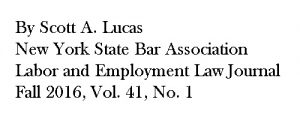


Article 6 of the New York Labor Law (Labor Law §§ 190-199-a) is a fee-shifting statute, the overall intent of which is to protect employees from having their rightful wages kept from them.[1] The statute “reflects the state’s ‘longstanding policy against the forfeiture of earned but undistributed wages.’”[2] To protect employees and remedy the imbalance of power between employers and employees,[3] it allows prevailing plaintiffs to recover unpaid wages, attorney fees and, unless the employer proves a good faith basis to believe that its underpayment of wages was legal, liquidated damages.[4]
Although passed “to strengthen and clarify the rights of employees to the payment of wages,”[5] Article 6 is poorly drafted, and courts have struggled to discern its meaning.[6]
Two of Article 6’s key provisions are Labor Law §§ 193 and 198. Labor Law § 193 prohibits any deductions from an employee’s wages unless the deduction is authorized and for the employee’s benefit.[7] Labor Law § 198 provides that “All employees shall have the right to recover full wages, benefits and wage supplements and liquidated damages accrued during the six years previous to the commencing of such action[.]”[8]
Some courts narrowly construe § 193 by drawing a purported distinction between deducting and failing to pay wages. These courts also overlook § 198’s rights-affirming language. As a result, these courts have concluded that Article 6 does not give all employees the right to recover unpaid wages.
The purported distinction between deducting and failing to pay wages is illusory and contrary to Labor Law § 193’s text and purpose. Although “deduction from wages” is suggestive of a deduction notation on a paystub, the purported distinction between “deducting” and neglecting to pay wages was implicitly rejected by the Court of Appeals in Ryan v. Kellogg Partners Institutional Services.[9]
The plaintiff in Ryan sued under Labor Law § 193 to recover an unpaid, nondiscretionary $175,000 bonus and attorney fees under Labor Law § 198(1-a). The plaintiff won at trial, and the Appellate Division affirmed, as did the Court of Appeals, which held, inter alia, “Since Ryan’s bonus … constitutes ‘wages’ within the meaning of Labor Law § 190(1), Kellogg’s neglect to pay him the bonus violated Labor Law § 193 …”[10]
Not all courts agree with Ryan’s holding, however. As a result, there is uncertainty about whether § 193 – the law that prohibits employers from taking even a small part of an employee’s wages – has a gaping loophole that exempts employers who take all of an employee’s wages.[11] As detailed herein, Article 6 does not contain any such loophole, gaping or otherwise.
Before exploring whether there is a meaningful distinction between deducting and failing to pay wages, one must ask whether it matters.